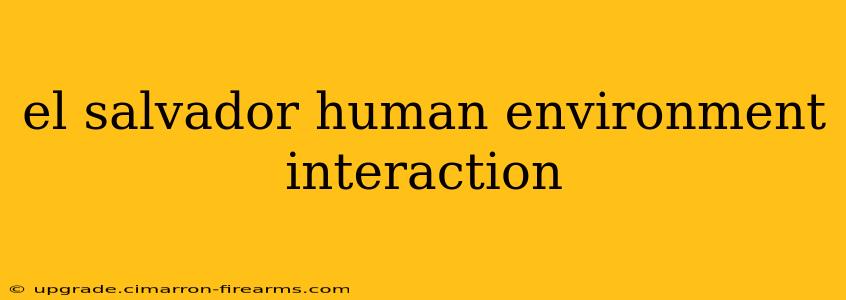El Salvador, the smallest country in Central America, boasts a rich tapestry of human-environment interactions, a complex relationship shaped by both the country's unique geography and its socio-economic history. Understanding this interplay is crucial to comprehending El Salvador's current challenges and its future prospects. This exploration delves into the multifaceted relationship between El Salvador's people and their environment, examining both the positive and negative impacts.
The Physical Environment: A Fragile Paradise
El Salvador's geography is characterized by volcanic landscapes, fertile valleys, and a Pacific coastline. This seemingly idyllic setting presents both opportunities and limitations. The fertile volcanic soils have historically supported a thriving agricultural sector, a cornerstone of the Salvadoran economy. However, this very fertility has also made the land susceptible to soil erosion and degradation due to intensive farming practices.
Volcanic Activity and its Impact:
The country's volcanic chain, while providing fertile land, also poses significant risks. Volcanic eruptions, though infrequent, can cause widespread devastation, impacting agriculture, infrastructure, and human life. Furthermore, the volcanic landscapes contribute to a high risk of landslides, particularly during the rainy season, further highlighting the fragility of the environment.
Deforestation and its Consequences:
Historically, El Salvador had extensive forest cover. However, centuries of deforestation for agriculture and timber have led to significant environmental degradation. This has resulted in increased soil erosion, water scarcity, biodiversity loss, and a heightened vulnerability to natural disasters. The loss of forest cover also contributes to climate change impacts, creating a vicious cycle of environmental degradation.
Human Impacts on the Environment: A Complex Legacy
El Salvador's population density is one of the highest in the Americas, placing immense pressure on its natural resources. This pressure manifests in several ways:
Agriculture and its Environmental Footprint:
While agriculture is vital to the Salvadoran economy, traditional farming practices have contributed to soil erosion, water pollution (from pesticide runoff), and biodiversity loss. The increasing demand for agricultural products, fueled by population growth and export markets, further intensifies these pressures. Sustainable agricultural practices are crucial for mitigating these negative impacts.
Urbanization and its Challenges:
Rapid urbanization has led to the expansion of urban areas, often at the expense of natural habitats. This encroachment on natural ecosystems results in habitat loss, increased pollution (air and water), and strain on infrastructure. Effective urban planning is essential for mitigating these impacts and ensuring sustainable urban development.
Climate Change and its Exacerbating Effects:
El Salvador is highly vulnerable to the effects of climate change. Increased frequency and intensity of extreme weather events, such as hurricanes and droughts, threaten food security, water resources, and human health. Rising sea levels pose a threat to coastal communities. Adapting to these climate change impacts is a critical challenge for El Salvador.
Moving Towards Sustainability: Challenges and Opportunities
Addressing the challenges stemming from human-environment interaction in El Salvador requires a multi-pronged approach:
Promoting Sustainable Agriculture:
Transitioning to sustainable agricultural practices, such as agroforestry and organic farming, is essential for reducing the environmental footprint of agriculture while improving food security.
Investing in Renewable Energy:
Reducing reliance on fossil fuels and investing in renewable energy sources, such as solar and geothermal, is crucial for mitigating climate change and improving air quality.
Strengthening Environmental Regulations:
Enacting and enforcing stricter environmental regulations is vital for protecting natural resources and preventing further environmental degradation.
Fostering Environmental Education:
Raising public awareness about environmental issues and promoting environmental education are crucial for fostering a culture of sustainability.
Conclusion: A Path Towards Harmony
The relationship between El Salvador's people and its environment is a complex and evolving one. While the country faces significant environmental challenges, there are also opportunities to build a more sustainable future. By embracing sustainable practices, investing in renewable energy, and strengthening environmental governance, El Salvador can strive towards a more harmonious relationship between its people and its environment, ensuring a prosperous future for generations to come.

